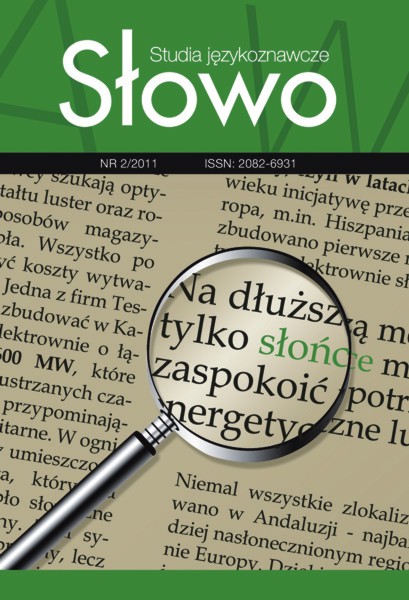Nowe społeczeństwo w ponowoczesnej rzeczywistości, czyli jak zmienia się językowo-kulturowy obraz społeczeństwa we współczesnej polszczyźnie
Abstrakt
In the article, the author attempts to show what changes have taken place within the meaning of the word society over the past 20 years, at the time of the evolution of Polish democracy and the renewal of the concept of civil society, as well as of the language and awareness of axiologial young people affected by the new social, economic, business and political situation existing after the overthrow of the Communist regime in 1989.
The basis for the analyses constitute the system of data and surveys collected in 1990, 2000 and 2010 (the ACE 90, 2000 and 2010). Their analysis leads to the conclusion that society is seen primarily as a specific group of people, the community, having a sense of unity, governed by certain rules and laws. However, over the last 20 years the role of psychosocial factors and living has increased.
Definitely we more often look over on society as a community of people interacting to cooperate with each other, having a sense of strong social ties and common values. Next to unity, solidarity, mutual assistance, tolerance and understanding of exhibit organisation, equality, have certain rights, and in 2010 stressed the social activity and entrepreneurship. Thus, in the new social structure and significant place next to the homo socialis is homo novum is the of the new, entrepreneurial, aware of its value, assertive, brisk, and rather absolute man.
Downloads
Bibliografia
Bogucka T., 1992, Nieuchronna normalność, ,Gazeta Wyborcza”, 28-29 XI.
Grabowska M., Mocek S., Wnuk-Lipiński E., 2001, Wybrane instytucje obywatelskie i polityczne [w:] Pierwsza dekada niepodległości. Próba socjologicznej syntezy, red. E. Wnuk-Lipiński i M. Ziółkowski, Warszawa.
Kowalczyk S., 1990, Zarys filozofii człowieka, Sandomierz.
Krzemiński I., 2000, Spór o Polskę 1989-99. Wybór tekstów prasowych, wstęp, wybór i układ P. Śpiewak, Warszawa.
Mycek S., 2006a, Człowiek i odpowiedzialność, Sandomierz.
Mycek S., 2006b, Etyka jako odpowiedzialność, Sandomierz.
Mycek S., 2009, Persona socialis. Teologiczne wymiary człowieka w społeczeństwie, Sandomierz.
Puzynina J., 1997, Słowo — wartość — kultura, Lublin.
Wnuk-Lipiński E, Sitkowski M. (red.), 2001, Pierwsza dekada niepodległości. Próba socjologicznej syntezy, Warszawa.
Ziółkowski M., Zagórski K., Koralewicz J., 2001, Wybrane tendencje przemian swiadomości społecznej [w:] Pierwsza dekada niepodległości. Próba socjologicznej syntezy, red. E. Wnuk-Lipiński i M. Ziółkowski, Warszawa.
Pobrania
Opublikowane
Jak cytować
Numer
Dział
Licencja
Prawa autorskie (c) 2011 Słowo. Studia językoznawcze

Utwór dostępny jest na licencji Creative Commons Uznanie autorstwa – Użycie niekomercyjne 4.0 Międzynarodowe.


